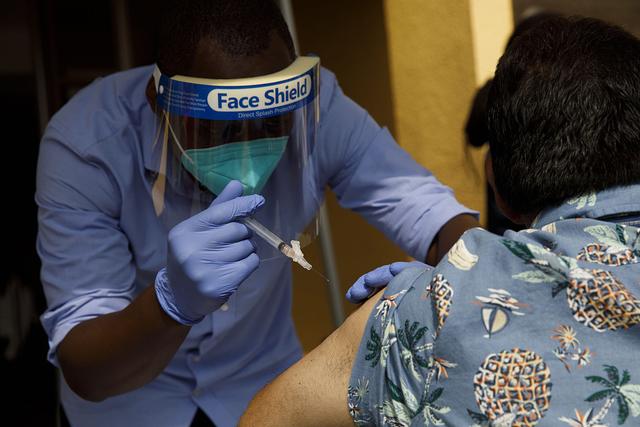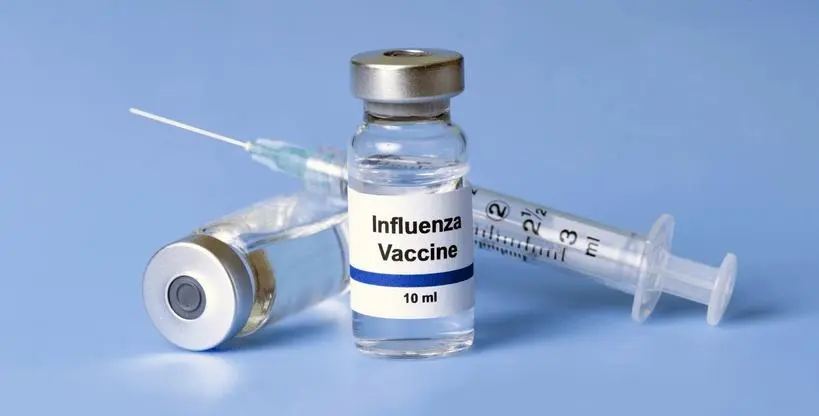The COVID-19 pandemic has been an ongoing crisis that has affected the entire world for almost two years now.
While the development of vaccines has provided some hope, the virus continues to mutate and evolve, leading to the emergence of new variants that pose a threat to public health.
Recently, health officials in the United States have expressed concern over the spread of the omicron variant of the coronavirus, which is believed to be more contagious than previous strains.
This concern is compounded by the fact that flu-like illnesses are also on the rise in many states, creating a perfect storm for the spread of respiratory viruses.
According to the Centers for Disease Control and Prevention (CDC), 17 states reported high levels of flu-like illnesses last week, up from 14 the week before.
This increase is likely due to a combination of factors, including holiday gatherings, travel, and a lack of vaccination among many Americans.
As people gather with family and friends for the holidays, they are more likely to come into contact with others who may be carrying the flu or COVID-19.
Additionally, many people who have not yet received the COVID-19 vaccine may be hesitant to do so, which increases their risk of contracting and spreading the virus.
In addition to the flu and COVID-19, health officials are also monitoring the spread of the omicron variant of the coronavirus. This variant was first detected in the U.S. in September and is believed to be more contagious than previous strains.
As of now, it accounts for an estimated 20% of COVID-19 cases in the U.S., but the CDC expects that number to rise to 50% in the next two weeks.
This rapid spread is concerning, as it suggests that the omicron variant may be able to evade the immunity provided by current vaccines and cause more severe illness.
To combat the spread of these respiratory viruses, health officials are urging Americans to take precautions such as getting vaccinated, wearing masks in public indoor settings, and practicing good hand hygiene.
These measures can help to slow the spread of the flu and COVID-19, as well as reduce the risk of contracting and spreading the omicron variant.
It is also important for individuals who are experiencing flu-like symptoms or have been exposed to someone with COVID-19 to get tested and isolate themselves to prevent further spread of the virus.
In conclusion, the rise in flu-like illnesses and the spread of the omicron variant of the coronavirus are concerning developments that highlight the ongoing threat posed by respiratory viruses.
While vaccines and other measures have been effective in slowing the spread of COVID-19, it is important for individuals to remain vigilant and take precautions to protect themselves and others.
By working together to reduce the spread of respiratory viruses, we can help to keep our communities healthy and safe.
The current state of global health is a topic of great concern for many individuals and organizations around the world.
With the emergence of new strains of viruses and the ongoing threat of seasonal illnesses such as flu, it is essential that we remain vigilant in our efforts to protect ourselves and our communities from these diseases.
One of the most recent concerns has been the emergence of new strains of the virus that causes COVID-19.

While these strains may spread more easily and be better at evading our immune systems, there is no evidence to suggest that they cause more severe disease than other recent variants.
This is reassuring news for those who have been vaccinated against COVID-19, as current evidence indicates that vaccines and antiviral medications are effective against these new strains.
In terms of seasonal illnesses such as flu, early signs suggest that current vaccines are well-matched to the strain that is causing the most illnesses.
However, it is important to note that this strain usually does not cause as many deaths and hospitalizations as some other versions.
Despite this, vaccinations for flu and other illnesses are down this year, which is a concerning trend.
According to the Centers for Disease Control and Prevention (CDC), only about 42% of U.S. adults had gotten flu shots by the first week of December, down from about 45% at the same time last year.
This is a worrying trend, as vaccinations are one of the most effective ways to prevent the spread of diseases such as flu.
Similarly, only about 18% of Americans have gotten an updated COVID-19 shot that became available in September, and only about a third of nursing home residents are up to date with COVID-19 vaccines.
These statistics are concerning, as they suggest that many people are not taking the necessary steps to protect themselves and their communities from these diseases.
It is essential that we all take responsibility for our health and the health of those around us by getting vaccinated against flu and other illnesses, as well as staying up to date with COVID-19 vaccines.
In conclusion, while the emergence of new strains of viruses such as COVID-19 is a concern, current evidence suggests that vaccines and antiviral medications are effective against these new strains.
However, vaccinations for flu and other illnesses are down this year, which is a worrying trend that could have serious consequences for public health.
It is essential that we all take responsibility for our health and the health of those around us by getting vaccinated and staying informed about the latest developments in the fight against these diseases.
The recent surge in respiratory infections, coupled with the low vaccination rates against respiratory viruses among older adults, has led to growing concerns among healthcare professionals and public health officials in the United States.
According to the Centers for Disease Control and Prevention (CDC), only 17% of adults aged 60 and older have received new shots against respiratory syncytial virus (RSV), a common cause of mild cold-like symptoms that can be particularly dangerous for infants and older people.
This low vaccination rate is especially worrisome given the current surge in respiratory infections, which is putting a strain on emergency rooms across the country.
In response to this situation, the CDC has issued an unusual health alert to U.S. doctors, urging them to immunize their patients against the trio of viruses that are currently causing the most respiratory infections: RSV, influenza, and COVID-19.
This alert underscores the importance of vaccination as a key tool in preventing the spread of respiratory infections and protecting vulnerable populations, such as older adults and infants.
The Carolinas are currently experiencing the heaviest traffic for respiratory infections in emergency rooms, according to CDC data posted this week.
While the situation is not as dire as some past winters, some patients are still waiting days to get a hospital bed, highlighting the strain on the healthcare system. Dr. Scott Curry, an infectious diseases specialist at the Medical University of South Carolina in Charleston, notes that the situation could easily worsen in the next four to eight weeks, especially if the weather turns colder.
The current situation underscores the need for increased public awareness about the importance of vaccination against respiratory viruses.
While vaccines are not 100% effective, they are still the best tool we have to prevent the spread of infectious diseases and protect vulnerable populations. Moreover, vaccines are safe and have been rigorously tested to ensure their efficacy and safety.
In addition to vaccination, there are other measures that individuals can take to protect themselves and others from respiratory infections.
These include washing hands frequently, avoiding close contact with sick people, staying home when sick, covering coughs and sneezes, and wearing masks in crowded indoor settings.
In conclusion, the recent surge in respiratory infections and the low vaccination rates against respiratory viruses among older adults are cause for concern.

The CDC’s health alert to U.S. doctors underscores the importance of vaccination as a key tool in preventing the spread of respiratory infections and protecting vulnerable populations.
It is important for individuals to take steps to protect themselves and others from respiratory infections, including vaccination, frequent hand washing, and other preventive measures.
By working together, we can help prevent the spread of respiratory infections and keep our communities healthy and safe.

